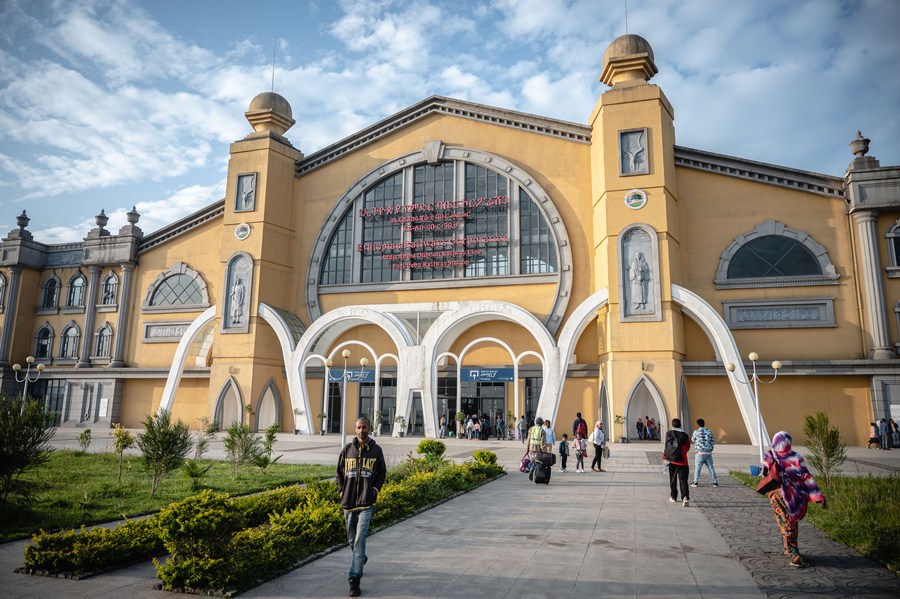
This photo taken on Sept. 9, 2023 shows the Lebu Railway Station in Addis Ababa, Ethiopia. (Xinhua/Wang Guansen)
The Chinese management contractors of the Ethiopia-Djibouti standard gauge railway officially handed over the railway’s management and operation to Ethiopia and Djibouti on Friday after six years of successful operation.
ADDIS ABABA, May 12 (Xinhua) — The Chinese management contractors of the Ethiopia-Djibouti standard gauge railway officially handed over the railway’s management and operation to Ethiopia and Djibouti on Friday after six years of successful operation.
This momentous occasion was marked by a celebration at the Lebu Railway Station on the outskirts of Addis Ababa, the Ethiopian capital. Senior Ethiopian and Djiboutian government officials, along with the Chinese diplomatic community in Ethiopia and the management contractor of the 752-km electrified transnational railway, gathered for the “Turnkey Ceremony.”
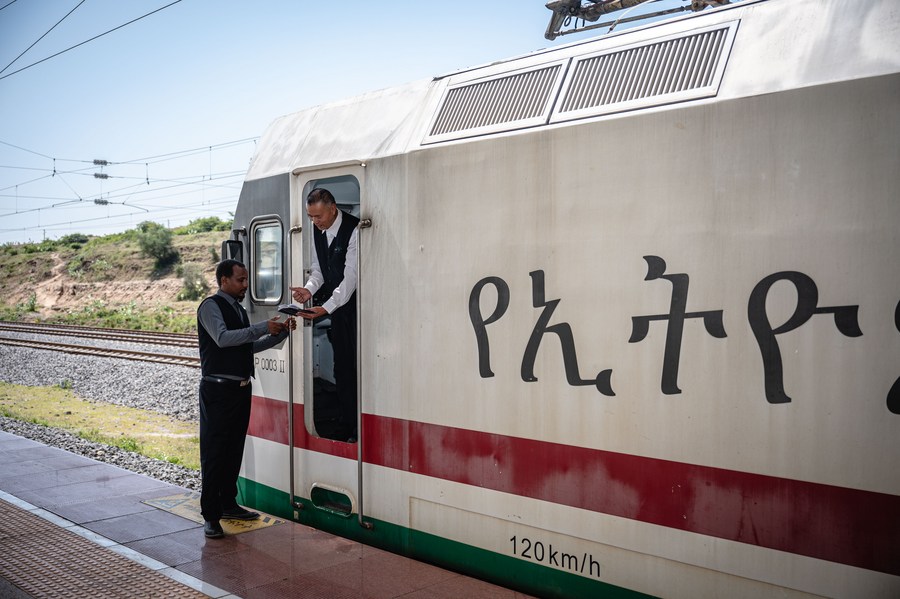
A local train driver receivs a notebook from his Chinese predecessor at the Adama station in Adama City, Ethiopia, Sept. 9, 2023. (Xinhua/Wang Guansen)
Ethiopian Minister of Transport and Logistics Alemu Sime said on the occasion that since its start of operations in January 2018, the railway has served as critical infrastructure, fostering connectivity between the two Horn of African nations.
“Its establishment stands as a testament to the collaborative spirit and shared pursuit of progress between the two countries. The successful completion and operation of the Addis Ababa-Djibouti railway has significantly enhanced trade and fostered closer ties between the two nations,” Sime said.
He said that the vital railway infrastructure has facilitated efficient transportation of goods under the Chinese management contractor, resulting in reduced costs and opening up new avenues for economic growth and development in both countries.

Passengers chat in the dining cabin of a train in Ethiopia on Sept. 9, 2023. The Chinese management contractors of Ethiopia-Djibouti standard gauge railway on Friday officially handed over the railway’s management and operation to Ethiopia and Djibouti after six years of successful operation. (Xinhua/Wang Guansen)
Abdi Zenebe, the chief executive officer of the Ethio-Djibouti Railway Share Company (EDR), highlighted the railway as a key component of the China-proposed Belt and Road Initiative (BRI), serving as a mutually beneficial cooperation platform that advances socioeconomic development across the two connected countries.
“Six years ago, we embarked on a journey to connect our two great nations, Ethiopia and Djibouti. EDR was born out of a vision for progress, prosperity and regional integration. Today, as we celebrate the successful operation and maintenance of this railway, we reflect on the remarkable achievements that have brought us here,” he said.
He further reaffirmed EDR’s commitment to enhancing its capacity building program to emerge as a center of excellence, nurturing talent, enhancing skills, and empowering its workforce.
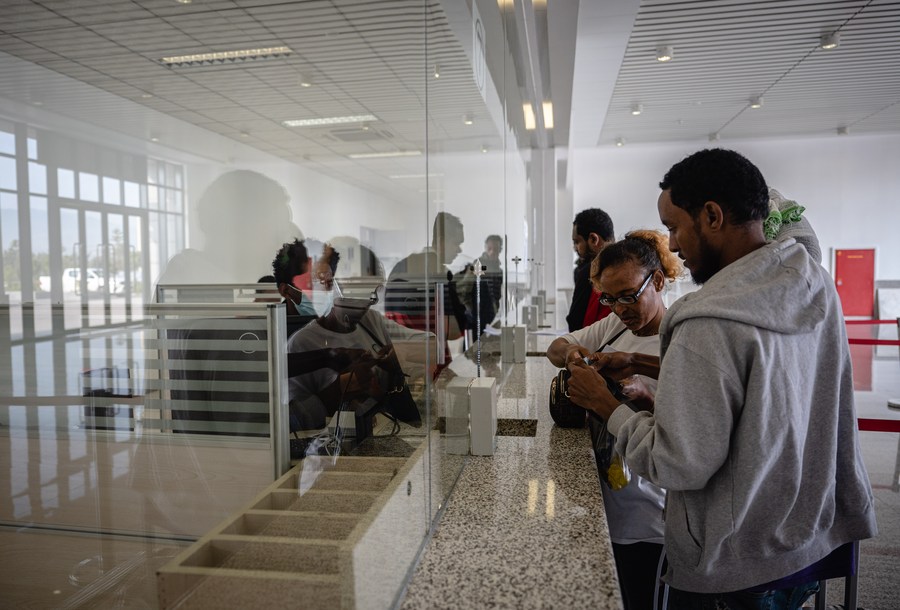
Passengers buy tickets at the Lebu Railway Station in Addis Ababa, Ethiopia, Sept. 9, 2023. (Xinhua/Wang Guansen)
Minister of Infrastructure and Equipment of Djibouti Hassan Houmed, on his part, commended the railway’s role in reducing transport time and cost, as well as its contribution to employment creation.
He highlighted the railway’s fast and streamlined transport system, which has enabled Djibouti to decongest its port infrastructure, promote passenger comfort and safety, and play a commendable role in environmental protection.
Data from the Chinese management contractor show that the railway has operated over 2,500 passenger trains with a passenger volume of 680,000 in six years. It has also operated over 7,700 freight trains, with a cargo volume of 9.5 million tonnes in the same period.
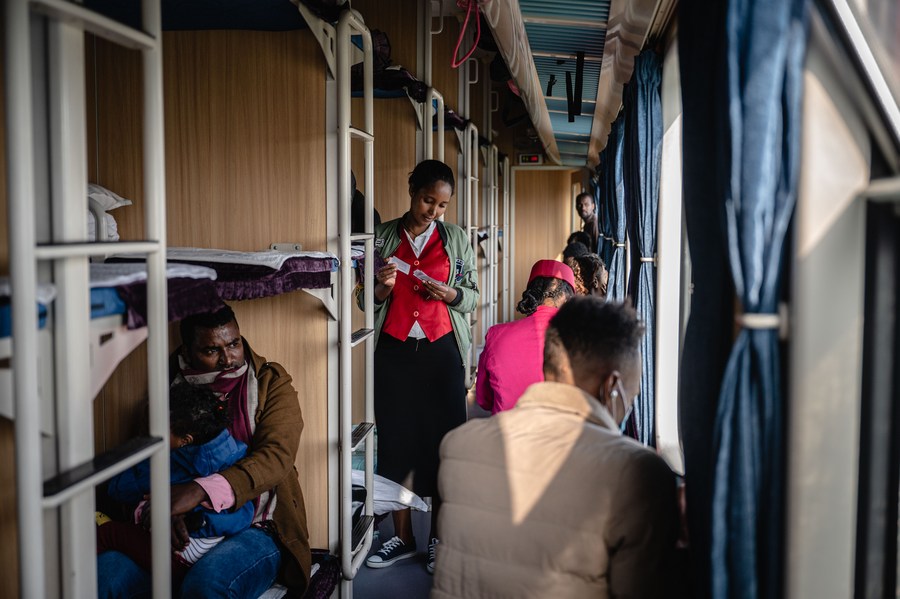
A train attendant checks passengers’ tickets in the cabin in Ethiopia, Sept. 9, 2023. (Xinhua/Wang Guansen)
The electrified railway has significantly reduced transportation time for freight goods between Ethiopia and Djibouti from more than three days to less than 20 hours, while also cutting costs by at least one-third.
Simultaneously, the railway has generated numerous local employment opportunities and has fully localized its workforce, with more than 3,000 local staff employed.
“The Chinese team is dedicated to promoting capacity building. A total of 2,840 individuals have been trained and certified, leading to the localization of all railway professions in the fields of operation, maintenance, and safety management,” said Guo Chongfeng, chief executive of the China Civil Engineering Construction Corporation Ethiopian branch, which constructed and maintained the railway in partnership with another company, China Railway Engineering Corporation.
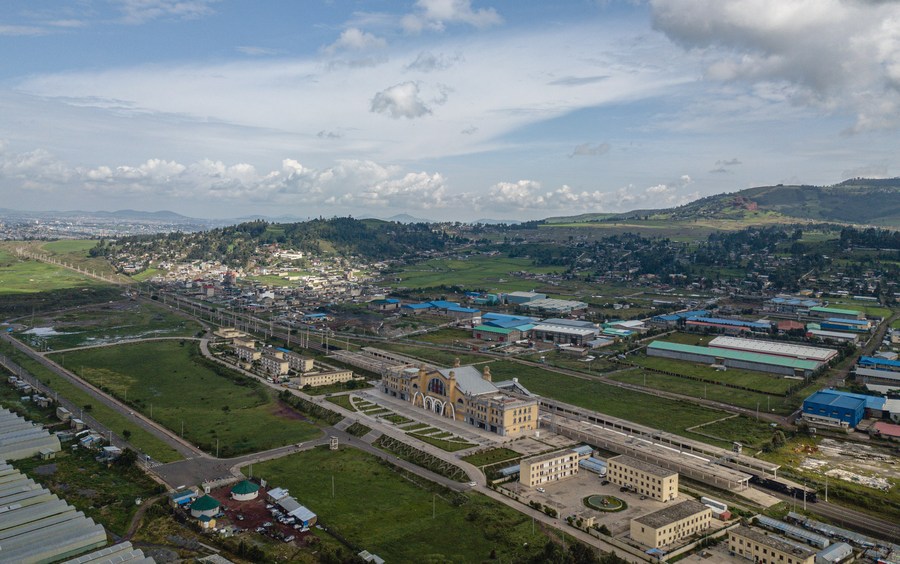
This aerial drone photo taken on Sept. 11, 2023 shows the Lebu Railway Station in Addis Ababa, Ethiopia. (Xinhua/Wang Guansen)
Guo said that the management contractor, with a focus on the railway’s future development, has organized leadership training for about 200 middle and senior management personnel. Additionally, they have trained about 100 local managers in China.
Ethiopia, a landlocked country in the Horn of Africa, accesses international maritime trade through ports in neighboring countries. The Ethiopia-Djibouti trade corridor serves as the primary gateway for Ethiopia, with approximately 90 percent of its imports and exports passing through it. ■
Source link : https://english.news.cn/20240512/de6e929b0b6e458a95122fa44a74dfff/c.html
Author :
Publish date : 2024-05-12 05:36:15
Copyright for syndicated content belongs to the linked Source.





